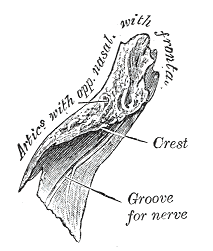The Nasal Bones
Anatomy > Gray's Anatomy of the Human Body > II. [Osteology]] > 5b. The Facial Bones. 1. The Nasal Bones
Henry Gray (1821–1865). Anatomy of the Human Body. 1918.
The Nasal Bones[edit | edit source]
(Ossa Faciei) & (Ossa Nasalia)
The nasal bones are two small oblong bones, varying in size and form in different individuals; they are placed side by side at the middle and upper part of the face, and form, by their junction, “the bridge” of the nose (Fig. 190). Each has two surfaces and four borders.
Surfaces[edit | edit source]
The outer surface (Fig. 155) is concavoconvex from above downward, convex from side to side; it is covered by the Procerus and Compressor naris, and perforated about its center by a foramen, for the transmission of a small vein.
The inner surface (Fig. 156) is concave from side to side, and is traversed from above downward, by a groove for the passage of a branch of the nasociliary nerve.
Borders[edit | edit source]
The superior border is narrow, thick, and serrated for articulation with the nasal notch of the frontal bone. The inferior border is thin, and gives attachment to the lateral cartilage of the nose; near its middle is a notch which marks the end of the groove just referred to.
The lateral border is serrated, bevelled at the expense of the inner surface above, and of the outer below, to articulate with the frontal process of the maxilla.
The medial border thicker above than below, articulates with its fellow of the opposite side, and is prolonged behind into a vertical crest, which forms part of the nasal septum: this crest articulates, from above downward, with the spine of the frontal, the perpendicular plate of the ethmoid, and the septal cartilage of the nose.
Ossification[edit | edit source]
Each bone is ossified from one center, which appears at the beginning of the third month of fetal life in the membrane overlying the front part of the cartilaginous nasal capsule.
Articulations[edit | edit source]
The nasal articulates with four bones: two of the cranium, the frontal and ethmoid, and two of the face, the opposite nasal and the maxilla.
Additional images[edit | edit source]
External links[edit | edit source]
- Anatomy figure: 22:02-07 at Human Anatomy Online, SUNY Downstate Medical Center—"Anterior view of skull."
- Anatomy photo:29:st-0206 at the SUNY Downstate Medical Center—"Orbits and Eye: Bones"
- Anatomy figure: 33:01-03 at Human Anatomy Online, SUNY Downstate Medical Center—"The bones of the lateral nasal wall."
Anatomy diagram: 34256.000-1(link). {{{website}}}. Elsevier.
| The facial skeleton of the skull | ||||||||||||||||||||||||
|---|---|---|---|---|---|---|---|---|---|---|---|---|---|---|---|---|---|---|---|---|---|---|---|---|
|
Gray's Anatomy[edit source]
- Gray's Anatomy Contents
- Gray's Anatomy Subject Index
- About Classic Gray's Anatomy
- Glossary of anatomy terms
Anatomy atlases (external)[edit source]
[1] - Anatomy Atlases
| This article is a medical stub. You can help WikiMD by expanding it! | |
|---|---|
| Human systems and organs | ||||||||||||||
|---|---|---|---|---|---|---|---|---|---|---|---|---|---|---|
|
Search WikiMD
Ad.Tired of being Overweight? Try W8MD's physician weight loss program.
Semaglutide (Ozempic / Wegovy and Tirzepatide (Mounjaro / Zepbound) available.
Advertise on WikiMD
|
WikiMD's Wellness Encyclopedia |
| Let Food Be Thy Medicine Medicine Thy Food - Hippocrates |
Translate this page: - East Asian
中文,
日本,
한국어,
South Asian
हिन्दी,
தமிழ்,
తెలుగు,
Urdu,
ಕನ್ನಡ,
Southeast Asian
Indonesian,
Vietnamese,
Thai,
မြန်မာဘာသာ,
বাংলা
European
español,
Deutsch,
français,
Greek,
português do Brasil,
polski,
română,
русский,
Nederlands,
norsk,
svenska,
suomi,
Italian
Middle Eastern & African
عربى,
Turkish,
Persian,
Hebrew,
Afrikaans,
isiZulu,
Kiswahili,
Other
Bulgarian,
Hungarian,
Czech,
Swedish,
മലയാളം,
मराठी,
ਪੰਜਾਬੀ,
ગુજરાતી,
Portuguese,
Ukrainian
Medical Disclaimer: WikiMD is not a substitute for professional medical advice. The information on WikiMD is provided as an information resource only, may be incorrect, outdated or misleading, and is not to be used or relied on for any diagnostic or treatment purposes. Please consult your health care provider before making any healthcare decisions or for guidance about a specific medical condition. WikiMD expressly disclaims responsibility, and shall have no liability, for any damages, loss, injury, or liability whatsoever suffered as a result of your reliance on the information contained in this site. By visiting this site you agree to the foregoing terms and conditions, which may from time to time be changed or supplemented by WikiMD. If you do not agree to the foregoing terms and conditions, you should not enter or use this site. See full disclaimer.
Credits:Most images are courtesy of Wikimedia commons, and templates, categories Wikipedia, licensed under CC BY SA or similar.
Contributors: Prab R. Tumpati, MD






